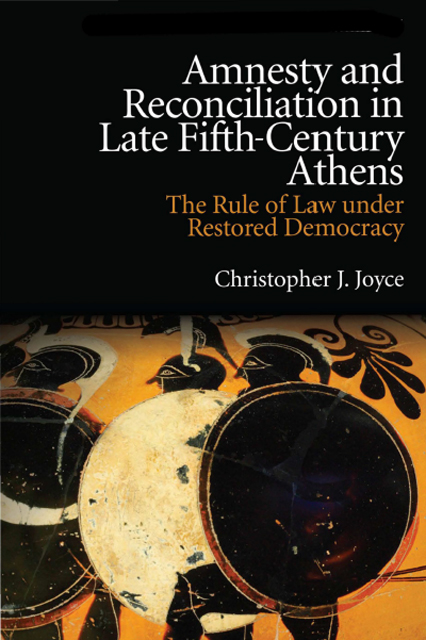Book contents
- Frontmatter
- Contents
- Preface and Acknowledgements
- List of Abbreviations
- 1 Introduction: The Athenian Reconciliation in Modern Scholarship
- 2 Civil Strife at Athens, 404–403
- 3 Oaths and Covenants
- 4 The Legal Scrutiny and the Resurrection of the Rule of Law
- 5 The Amnesty Applied (I): The Trials of Agoratus and Eratosthenes
- 6 The Amnesty Applied (II): The Trials of Callimachus and Socrates
- 7 The Athenian Reconciliation as the Paradigm for the Greek World in the Classical and Hellenistic Ages
- 8 The Rule of Law Restored: The Legacy of the Reconciliation in the Fourth Century
- Bibliography
- Index Locorum
- Subject Index
1 - Introduction: The Athenian Reconciliation in Modern Scholarship
Published online by Cambridge University Press: 03 June 2023
- Frontmatter
- Contents
- Preface and Acknowledgements
- List of Abbreviations
- 1 Introduction: The Athenian Reconciliation in Modern Scholarship
- 2 Civil Strife at Athens, 404–403
- 3 Oaths and Covenants
- 4 The Legal Scrutiny and the Resurrection of the Rule of Law
- 5 The Amnesty Applied (I): The Trials of Agoratus and Eratosthenes
- 6 The Amnesty Applied (II): The Trials of Callimachus and Socrates
- 7 The Athenian Reconciliation as the Paradigm for the Greek World in the Classical and Hellenistic Ages
- 8 The Rule of Law Restored: The Legacy of the Reconciliation in the Fourth Century
- Bibliography
- Index Locorum
- Subject Index
Summary
The Athenian Reconciliation of 403 bce is one of the most complex and disputed episodes from Greek history. Contracted following a desultory civil war, when Athens had been split between supporters of democracy and oligarchy, the purpose of the Reconciliation Agreement was to rebuild the city and reunite the citizenry. To accomplish that end, legal measures needed to be put in place to guarantee peace. But how far it was effective, and what precisely it sought to achieve, are matters upon which modern scholarship remains sharply divided. Much of the difficulty lies in the source material, often contradictory and unreliable. Scholarship moreover has reached no consensus as to what democracy in ancient Athens was or why the legislators of 403 decided to revive democracy, when other forms of government were available. Besides reconciling the citizens, the commissioners of 403 redevised the democratic constitution. As the evidence for the Athenian Reconciliation Agreement of 403 is scattered, there is never going to be agreement over every one of its details. One of the chief objectives of this study is to show that the period of recovery from the brutal and divisive civil war which followed Athens’ defeat in the Peloponnesian War (431–404) was expertly overseen and managed, resulting in a community which was coherent, workable, lawful and democratic. The revival of democracy in 403 was possible only because Athenians were willing to bury the past. This entailed more than a moral commitment: the pledge ‘not to revisit past grievance’, in Greek μὴ μνησικακεῖν, was a legal commitment not to prosecute in court crimes committed before 12 Boedromion 403, the date of the treaty to which both sides swore. Though a superficial reading of the orators might give rise to the impression that the Oath of Reconciliation was not adhered to in earnest, a more careful analysis will show that its terms were carefully laid out and strictly applied thereafter. Athens reconciled in 403, and the spectre of civil war which could have resurfaced in the years that followed never reared its head again until the Macedonian involvement towards the end of the fourth century when, in the wake of the Lamian War, Athens experienced revolutions and stasis owing to foreign intervention.
- Type
- Chapter
- Information
- Amnesty and Reconciliation in Late Fifth-Century AthensThe Rule of Law under Restored Democracy, pp. 1 - 37Publisher: Edinburgh University PressPrint publication year: 2022

